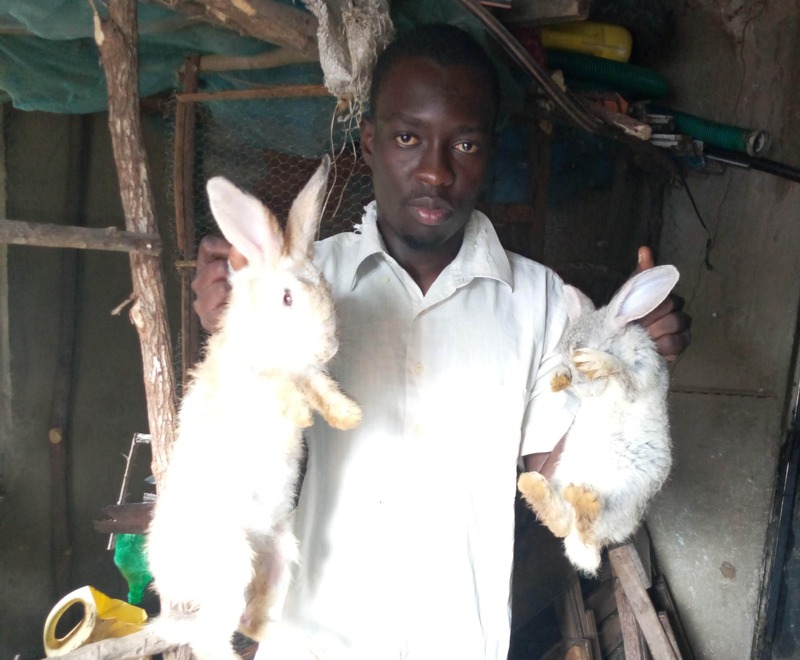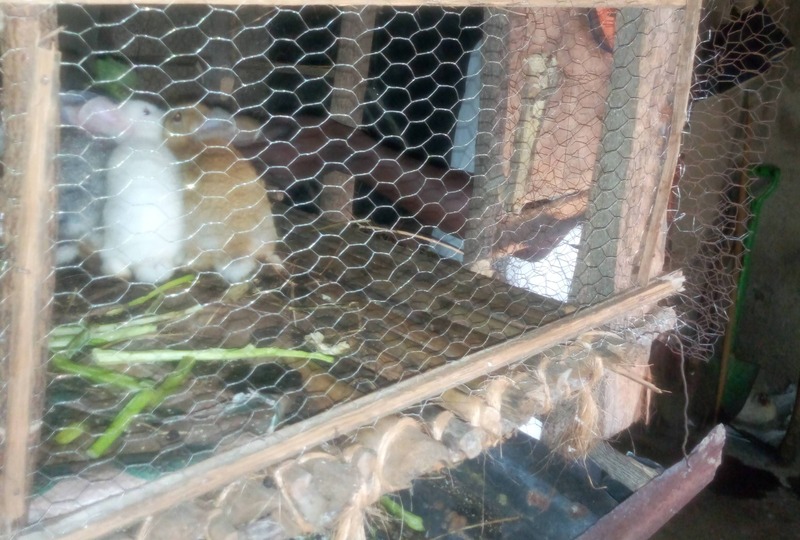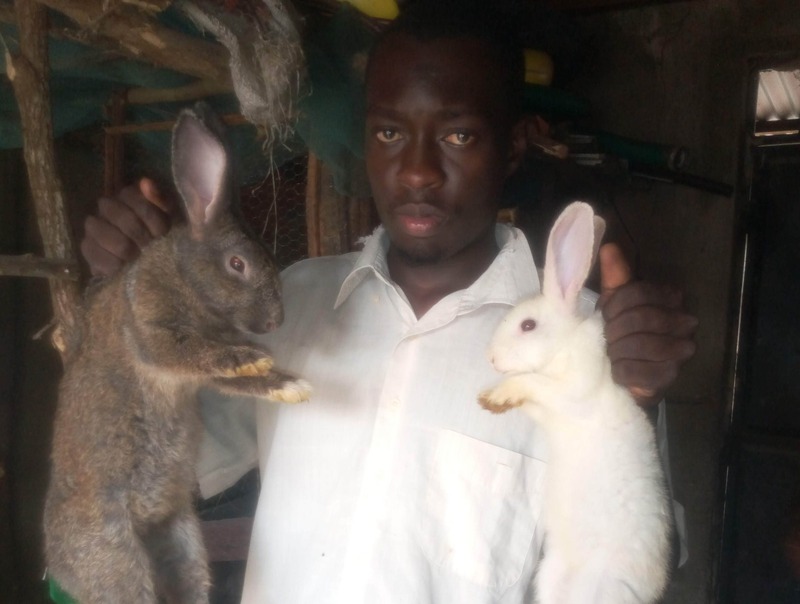How 19-year-old man turned rabbit rearing into profitable venture in Kwale

Swaleh sells a mature rabbit for Sh10,000 and a litre of urine for Sh500, making about Sh50,000 a month.
A 19-year-old from Kwale County has successfully ventured into rabbit farming, discovering notable returns from the enterprise.
Motivated by his success, he now advocates for other farmers to diversify their agricultural practices, including poultry and rabbit keeping, as strategies to mitigate the financial impacts of climate change.
More To Read
- How Kwale youth are transforming madafu waste into eco-friendly resources
- Relief for mothers in Kwale County as upgraded maternal health facility launched
- Locals around Kwale’s Mwache Dam embrace strategies to reshape region’s future
- Seaweed farming brings hope to Kwale residents hit by climate change
Raised in a family that engages in agriculture, Ibrahim Swaleh gained early exposure to various farming methods, encompassing both animal husbandry and crop cultivation.
"My parents depend 100 per cent on farming, so climate change has affected our livelihood. I remember a time when my rabbits, which I kept as pets, were the ones that sustained us after our crops failed," he said.
As a young boy, Swaleh kept rabbits as pets. Their smooth fur and playfulness amused him.
However, after completing his secondary education in 2021, he decided to turn his hobby into a business to keep him busy while earning money at the same time.
He keeps a variety of breeds, including Chinchilla, California White rabbits, and Cinnamon rabbits, which are best for commercial purposes.
He lives in a remote village in Pongwe, Kwale County, where 'Ibra Sungura' has become a common name among the youth as well as children due to the popularity he has gained from his rabbit business.
"I started keeping rabbits while I was in Standard Seven, keeping pets is my hobby, and the beauty of rabbits made me include them in my collection of pets. I got them from a friend who sold me three California White rabbits for Sh3,000. However, I did not know that such small animals could make me earn enough money to support my family and have some savings," he said.
He realised the potential of rabbits after he attended a local training organised by an NGO to empower youths in rural areas through rabbit rearing.
"The training was an eye-opener for me. Earlier, I was giving out my rabbits to friends and even relatives for free or charging them a small fee. However, after the training, I realized that I could earn a lump sum through selling the animal's by-products, such as urine, fur, and meat," he said.
 Some of the rabbits at Ibrahim Swaleh's farm in Pongwe, Matuga Sub-county, Kwale County. (Mishi Gongo)
Some of the rabbits at Ibrahim Swaleh's farm in Pongwe, Matuga Sub-county, Kwale County. (Mishi Gongo)
Swaleh sells a mature rabbit for Sh10,000 and a litre of urine for Sh500, making about Sh50,000 a month.
He sells the animals to butchers for meat and to other farmers who want to start keeping rabbits.
His brood has increased since then. He feeds the animals on the blackjack, pigweed, sukuma wiki, cabbages, and rabbit pellets.
He advised farmers to combine both commercial rabbit feed and supplementary feed in their feeding regime, to cut costs since commercial rabbit feed pellets are more expensive than supplementary feed.
Other supplementary feeds to give rabbits include fruits such as melons, tree leaves (mango and banana tree leaves), and vegetables (cabbage, lettuce, spinach, and carrots). Providing sufficient feed to rabbits ensures that they get all the required nutrients needed for growth.
The growth potential of your rabbits will depend on the nature and quality of the parent rabbits.
He says with proper feeding, a doe can give birth to up to 12 kits, with its gestation period being 31 days. "I started with three rabbits, and now I have about 100 animals. I keep them in cages that I have constructed from boards and wire mesh to prevent them from getting attacked by wild animals or escaping," he said.
Basic hygiene
The young farmer said taking care of rabbits is not as easy as many think. "I clean them twice a day to prevent the spread of diseases such as diarrhoea," he says.
He regularly buys a new buck to prevent inbreeding, which could lead to the production of weak kits.
When it comes to housing, Swaleh says rabbits are very flexible. They don't necessarily need expensive or elaborate housing units compared to other domesticated animals. There are two major ways of housing rabbits: the deep litter system and the cage system.
 Ibrahim Swaleh at their farm in Pongwe, Matuga Sub-county, Kwale County. (Mishi Gongo)
Ibrahim Swaleh at their farm in Pongwe, Matuga Sub-county, Kwale County. (Mishi Gongo)
The deep litter system is essentially floor-based and entails covering the floor with bedding such as dead leaves or grass. The cage system simply means keeping them in cages, with the cages either kept indoors or outdoors.
According to Mwanaisha Mwasalimu, an animal expert, a healthy rabbit should have smooth skin, clean eyes without tears or redness, and should not have wounds on the skin, eyes, mouth, or ears.
She added that rabbit meat is cholesterol-free, therefore, good for the heart, and has a high percentage of digestible proteins.
Swaleh narrated that his day starts at 5 am when he cleans their shelters before replacing their feeds with fresh leaves.
Asked how he taps the animal urine, Swaleh said, a hutch is constructed in such a way that the urine seeps through the wire mesh into corrugated plastic sheets, to the gutter, and finally into a bucket.
"Rabbits have a habit of passing urine in the same position. This makes it easier for me to collect the urine as it seeps through the wire mesh floor into a corrugated plastic container to the gutter and finally to the bucket," he explained.
He uses rabbit urine on his family farm, where they grow Sukuma wiki, tomatoes, chillies, ladyfingers, eggplant, and maize as fertilizer and insecticide. He also decomposes the animal stool, to get worms which he feeds to his mother's Kienyeji chicken, saying the worms are high in nutrients.
He said he chose to keep rabbits because they have fewer expenses compared to other animals. "They require less space for their shelters. I feed them on weeds which I find on our farm," he said.
He advised other farms to not depend on crops alone but to practice other forms of farming, such as keeping poultry and rabbits, which are economical to keep.
"As farmers, we need to have backup plans. When the crops fail, then at least the animals can sustain you," he said.
Top Stories Today










































